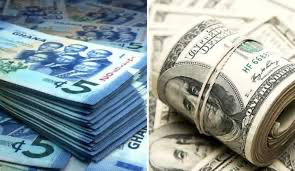
Adnan Adams Mohammed
As the Ghanaian currency, Cedi, losses value further edging to GHc17 to a US dollar, the Bank of Ghana Governor has shared his frustrations.
Dr Ernest Addison indicates that, despite the wishes of Ghanaians of seeing a stronger cedi against the international trading currency, the health of the economy is also a concern, that is why the Central tries to manage between the country’s reserves and the exchange rate.
The BoG’s approach this is to balances the need to strengthen reserves with prudent currency management, striving to foster longer-term stability and investor confidence.
“We have $7 billion in foreign exchange reserves. If I want to drive the dollar-cedi rate to GHS 10, I can do that tomorrow. But what about the day after tomorrow? So, we are balancing various factors, trying to build reserves and manage the exchange rate. All is not lost yet; there is some silver lining in the cloud,” Dr. Addison said while speaking at the launch of ‘The Concise Law of Banking,’ a newly published banking law guide.
“These are the problems in our economy. The issues about the exchange rate and financial sector. But I think the good news is that we are making progress because the developments we are seeing are not different from other jurisdictions,”
As the season inches closer, the depreciation of the Cedi is expected to continue at a faster rate. However, the Central Bank plans to slow or maintain the current exchange rate amidst Ghana’s progress under the International Monetary Fund’s (IMF) Extended Credit Facility programme.
The local currency declined against major global currencies last week, fuelled by increasing demand from both domestic and offshore markets.
To address this, Ghana’s Central Bank accepted all bids—amounting to $89.3 million—in its weekly seven-day foreign exchange auction.
However, this intervention did little to bolster the cedi, which fell by 1.06% week-on-week, settling at an average of GH¢16.55 per U.S. dollar.
The currency also slipped 0.23% and 0.28% against the British pound and the euro, respectively.
This week opened with the cedi trading at GH¢16.65 to the dollar, extending its slide.
Since the start of the year, the cedi has lost over 26% of its value against the dollar, ranking it among the three weakest currencies in Sub-Saharan Africa.
Looking ahead, the Central Bank plans an additional $20 million auction directed at Bulk Oil Distribution Companies (BDCs) in a bid to relieve some of the demand pressure.



